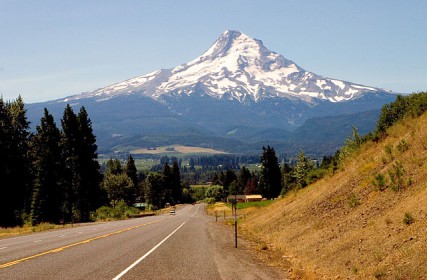
To the outside observer, the US Highway 26 project was innocuous, if a bit of a traffic impediment. The 2008 construction project, intended to widen a dangerously narrow 1.5 mile section of the Mt. Hood highway in Oregon, would provide improved passage for cars turning left.
Hereditary Chief Wilbur Slockish, however, says the project has destroyed his freedom of religion, and is suing for damages.
“I am concerned that if I try to enter the A.J. Dwyer Scenic Area I will be arrested. Since the logging took place, whenever I would go to the site, the Oregon State Police would stop alongside the highway and observe me. I have even seen people in plain clothes in unmarked cars photograph me. It is impossible for me to practice my religion,” Slockish said in a court statement.
His demands in the suit include restoring the land to its original state, as well as a promise to consult with local tribal members on future construction projects.
“If the court orders the Federal Highway Administration and the Bureau of Land Management to restore both of the accesses to the A.J. Dwyer Scenic Area, and remove the mound that covers the historic campground and burial grounds, as well as replanting the trees and vegetation to restore the needed camouflage, I should be able to visit this sacred place. I would then be able to resume my prior religious activities at this site,” Slockish said.
For Native American people who once used the area for worship, the project leveled a sacred burial ground and cut off access to a place they had used for decades to pray, meditate and camp. The Oregon Department of Transportation (ODOT) and the U.S. Federal Highway Administration went through the usual precautionary steps before starting the project, including conducting and environmental assessment of the area and conducting public reviews of the project in 2005. According to ODOT documentation, the public meetings, attended by approximately 30 people, did not incur any protests about the highway projects.
Klickitat and Cascade Tribal Chief Slockish and his lawyer at The Becket Fund, Luke Goodrich, think otherwise. They contend that the environmental assessments conducted by ODOT ignored the presence of previously identified native burial monuments in the area, as well as campsites used by the Clackamas, Yakima and Klickitat tribes for prayer and meditation.
The plaintiffs, who said they did not receive notice of the highway project during the scheduled public comment period before construction, sent letters of protest the Highway Administration and Bureau of Land Management in 2008 after the project began, offering alternative ways to build that did not destroy sacred monuments or cut off access to local worship areas. However, it was too late. The sites were destroyed.
Slockish and fellow plaintiffs Carol Logan, Johnny Jackson, the Cascade Geographic Society and the Mount Hood Sacred Lands Preservation Alliance enlisted the help of Goodrich and The Becket Fund in 2011. The Becket Fund, a non-profit organization that provides legal aid on behalf of religious freedom for all faiths, noticed the Slockish case for a few reasons, Goodrich said.
For one thing, the case involves a Religious Freedom Restoration Act (RFRA) claim. The legislation in RFRA is relatively new, signed into law by President Clinton in 1993, and precedents are still being set in the courts. Briefly, the act states that the government cannot substantially burden people’s right to exercise their religion with laws or rules, even if the law or rule in question is not related to religion.
“[The Slockish case] is important to establish the rights of Native Americans under RFRA,” Goodrich said.
Cases like this one can go either way, and both political parties are using RFRA legislation to lobby for their goals in the courts, Goodrich said. For example, many conservative groups are using RFRA to protest the contraceptive mandate established under the affordable care act, saying it forces employers of certain religion to act against their religion to provide such care.
Native Americans like Slockish are using the law to protest government expansion onto land they consider sacred.
During court proceedings, the plaintiffs were asked to describe why their activities in the contested area, and to explain why the land mattered to them.
“When you practice the Washut religion, you will visit those traditional spiritual places, like the A.J. Dwyer Scenic Area,” Jackson said. “It is part of the natural environment of Mount Hood, in the woods, but it is like a church that never had walls, never had a roof, and never had a floor. But, it is still just as sacred as a white person’s church that is all enclosed and separated from Nature.”
Jackson believes his people can go to heaven and be with their creator if their graves and resting places have been left in peace. He feels the activities in the A.J. Dwyer area will prevent that from happening, akin to someone breaking into a cemetery.
“What happened at Dwyer Forest, a sacred place for me and my people, has caused me great spiritual pain and intense emotional distress, of which there are no words to describe such feelings. What does one do when this happens?”
According to court documents, the highway administration and ODOT claimed to follow correct procedure in notifying the public and conducting the environmental assessment. When no protest was made during the public comment period, they went forward with construction.
ODOT was contacted for comment, but refused to discuss the case.
The Slockish case is still undecided, Goodrich said. Slockish, Jackson and the other plaintiffs are currently discussing settlements with the ODOT and the highway administration. He hopes they will receive a settlement, but the outcome is currently unclear.









